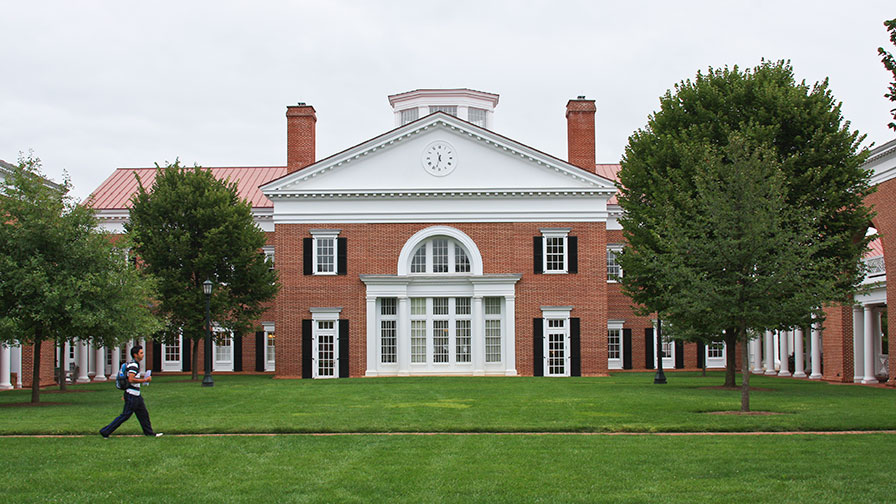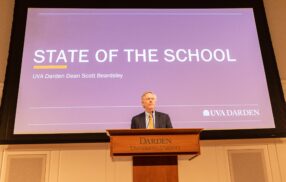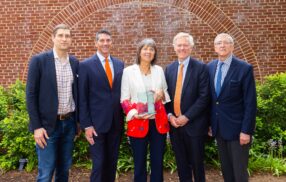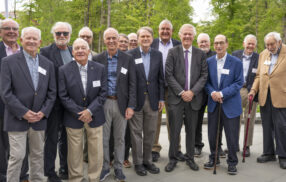
Former Genzyme CEO Fought for People with Rare Diseases and the Company’s Integrity
“We wanted to make a big difference — not a small difference, not an incremental difference, but a treatment or curing difference, if we could,” said Henri Termeer (MBA ’73), former president and CEO of Genzyme Corporation.
What began as a desire to save lives turned into a series of small bets that resulted in a treatment for Type 1 Gaucher disease — a debilitating genetic disorder for which there was no treatment some 20 years ago. It is also the beginning of the story of Genzyme Corporation, one of the world’s biotechnology giants. Termeer chronicled the company’s journey from a small startup to a life-saving, innovative company at the University of Virginia Darden School of Business. The fireside chat was sponsored by Darden’s Leadership Speaker Series and mediated by Darden Professor Ken Eades.
People with Type 1 Gaucher disease lack an enzyme that helps them break down lipids. How Genzyme could harvest this enzyme initially depended upon one thing: women having babies.
The scientists needed placentas to develop the treatment. After many unsuccessful attempts, Termeer’s team finally found a way to deliver the enzyme to its target in the body with help from collaborators at the National Institutes of Health (NIH). An NIH physician sought and received permission to have the enzyme tested in her sick, 3-year-old son who suffered from Gaucher disease. The boy experienced a remarkably fast and positive response to the therapy. The success was bittersweet.
“20,000 babies needed to be born to treat one patient for one year. There weren’t enough placentas to go around,” said Termeer.
In addition, the Genzyme team and their collaborators had to convince scientists that the treatment could work not just for one child, but for everyone who had the condition.
The chase for an effective therapy continued.
They raised more money and formed a limited partnership. The mother of the 3-year-old flew with Termeer to meet the investors. By this time, she was pregnant with her second child, who also carried the disease.
The mother successfully advocated for the experimentation of Genzyme’s new treatment, after which she informed Termeer that she thought she was in labor. “I’m a derailed economist,” he joked, “I can’t help you.”
Her labor turned out to be a false alarm but the positive outcomes of the therapy were real. Patients from Germany, South Africa and other parts of the world participated in Genzyme’s new study. All of the patients benefitted. One of Termeer’s biggest rewards was seeing the healthy growth and development of young people who suffered from the horrible condition.
“About a year or two ago we brought everybody back together. They are all now grown up, have their own kids and they are all being treated every two weeks. They have normal lives,” Termeer said.
The successful treatment of Gaucher disease became the foundation for Genzyme’s company culture. The company went on to invent new therapies for genetic conditions such as Pompe disease, Fabry disease and certain cancers.
“Even if no one believes it, but you believe, you may actually be right,” Termeer said, imploring the audience of students never to give up.
However, the company would soon battle threats not to health, but of a different sort. Carl Icahn, a well- known activist investor, waged a proxy fight for financial control of Genzyme.
“One day, in 2007, in an October reporting of Icahn’s investments, we found our name on his list,” said Termeer. “There was a big value here for companies that had a lot of cash flow and needed to replenish their pipelines.”
Termeer and his team waged a public battle in the media. He called upon The Wall Street Journal to tell the story.
“They took us up on the opportunity, and they were very constructive. We were in the Journal a lot at that time and we said, ‘We can’t help big pharma because it was better for shareholders to stay involved with the approach that we chose because the value creation was significant.’ Why would we dilute that success and what did they know about these rare diseases?” Termeer asked.
Another big Genzyme investor, Ralph Whitworth, emerged with ideas on how the company should operate. This time, the interaction was a little more amicable. Termeer was able to secure a seat on Genzyme’s board for Whitworth, which also helped thwart Icahn’s efforts to oust him.
Once an expanded board was in place, Genzyme set upon a new era. Termeer was able to leave on his own terms and with the knowledge that he led an organization that saved lives in a significant way.
Termeer became president of Genzyme in 1983, CEO in 1985 and chairman in 1988. Before joining Genzyme, he worked in management for Baxter Travenol, now known as Baxter International. Termeer is a board member of Partners HealthCare and a member of the board of fellows of Harvard Medical School. He is also a director of Massachusetts General Hospital, where he and his wife recently donated $10 million to establish the Henri and Belinda Termeer Center for Targeted Therapies. The new center will be a destination for personalized medical treatment for various cancers.
Termeer studied economics at the Economische Hogeschool at Erasmus University in The Netherlands and earned his MBA from the Darden School in 1973.
The University of Virginia Darden School of Business prepares responsible global leaders through unparalleled transformational learning experiences. Darden’s graduate degree programs (MBA, MSBA and Ph.D.) and Executive Education & Lifelong Learning programs offered by the Darden School Foundation set the stage for a lifetime of career advancement and impact. Darden’s top-ranked faculty, renowned for teaching excellence, inspires and shapes modern business leadership worldwide through research, thought leadership and business publishing. Darden has Grounds in Charlottesville, Virginia, and the Washington, D.C., area and a global community that includes 18,000 alumni in 90 countries. Darden was established in 1955 at the University of Virginia, a top public university founded by Thomas Jefferson in 1819 in Charlottesville, Virginia.
Press Contact
Molly Mitchell
Associate Director of Content Marketing and Social Media
Darden School of Business
University of Virginia
MitchellM@darden.virginia.edu





